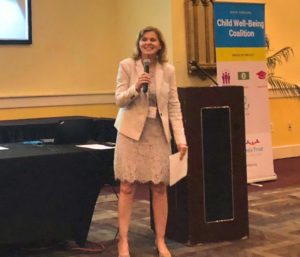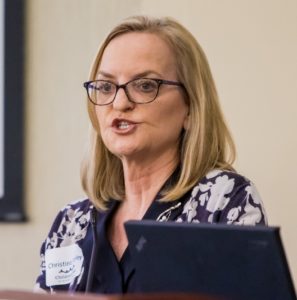The South Carolina Child Well-Being Coalition, which is led by Children’s Trust, held its second full meeting Oct. 31 to continue its discussion on improving outcomes for children experiencing poverty. Neil White, who tells the stories of Children’s Trust, covered the event.
Dr. Lilian Peake looked out over a room of 85 child-serving professionals at the Brookland Baptist Church Conference Center and saw energy. She saw commitment. She saw promise. And she saw a better future for South Carolina’s children.
The director of public health for the S.C. Department of Health and Environmental Control (DHEC), Peake was feeling hopeful as she addressed members of the Child Well-Being Coalition, a DHEC-funded effort led by Children’s Trust that seeks to mitigate the devastating effects of systemic poverty on children in this state.
A group of local and state agencies, social service organizations, and community leaders committed to improving the lives of children with a focus on supporting and implementing evidence-based and promising programs and policies, the coalition launched in May with a goal of having a positive impact in the five core areas of community, economy, education, family and health.

Dr. Lilian Peake, DHEC
Peake discussed how building the resilience of children is one of the key components of DHEC’s 2018 State Health Improvement Plan. She is convinced the work being done by the 108 partner organizations in the Child Well-Being Coalition can play an important role.
“The power of coalitions is bringing lots of different communities and organizations together to align what we’re doing. The more we can speak to that, the more progress we can make,” Peake said. “What’s exciting about the Child Well-Being Coalition is it’s looking at the foundations of health and getting children out of poverty. The coalition is trying to bring people together across sectors. All of these sectors must come together to improve health and well-being. And it’s exciting to see the coalition focused on science and best practices that improve health.”
Amy Moseley, the Children’s Trust community coalitions manager who is guiding this endeavor, has watched the coalition’s workgroups in the five areas come together over the last six months and develop their issue areas and strategies. The workgroups have been focused on examining existing data and identifying needs where they can influence change for children impacted by poverty across the state.

The community workgroup and the economic workgroup are both exploring the utilization of nutrition programs by eligible families in poverty. The education workgroup is addressing the reduction of missed school days due to suspension, expulsion and illness from pre-K to graduation. The family workgroup is studying increased awareness and support of kinship care, single-parent and multi-generational homes. The health workgroup is looking at coordination and access to comprehensive health care for children.
“The amount of progress they have made is phenomenal,” Moseley said. “In the next several months, the workgroups will be developing their evaluation goals with specific indicators they want to see as outcomes for their issue areas.”
Dr. Christine Turley, the director of the USC School of Medicine’s Research Center for Transforming Health, serves as the chair of the coalition’s leadership team. She called the plan to optimize opportunity for all of South Carolina’s children in order for them to reach their full potential a “big and audacious” one.

Dr. Christine Turley, USC
The goals include supporting parents and caregivers to build the protective factors for safe environments in homes; linking and growing behavioral health services in schools and community settings; providing learning environments that understand trauma and address children equitably; and combatting child hunger.
Turley knows the impact of poverty on children and their families is multi-generational and far-reaching. She likes the makeup of the coalition.
“We have 108 partners interested in the vision for child well-being. That speaks volumes to the things we care about,” Turley said. “Everyone brings something valuable to this work.”
Aditi Srivastav, Children’s Trust research and community impact manager, gave a report on the 2018 KIDS COUNT Data Book, which annually ranks the 50 states using national, state and local data on key indicators of child well-being. South Carolina ranked No. 38 in this year’s book, the state’s highest-ever ranking that’s the result of four consecutive years of improvement.
“While it’s exciting that we are making steady progress, we understand much work remains to be done,” Srivastav said.

Amy Moseley
The coalition will continue that work in a broad and comprehensive manner. The leadership committee has identified four values that will reinforce this effort. They are cultural competence, prevention, strengthening families and equity.
Moseley said she is excited to see where this coalition goes in the next year, and she’s confident that great things are ahead for the coalition as it works to provide positive outcomes for children and families in South Carolina.
Turley believes the state’s future is linked to what it does for children, something she notes is a worthy long-term investment. As momentum builds, the action-oriented coalition continues to seek like-minded partners with the interest and dedication.
“This is a fast-moving train, but we have plenty of seats for anyone who wants to join in this work,” Turley said.
For those interested in more information about joining the Child Well-Being Coalition, contact Amy Moseley at 803-744-4032 or amoseley@scchildren.org.




